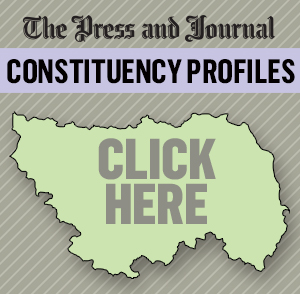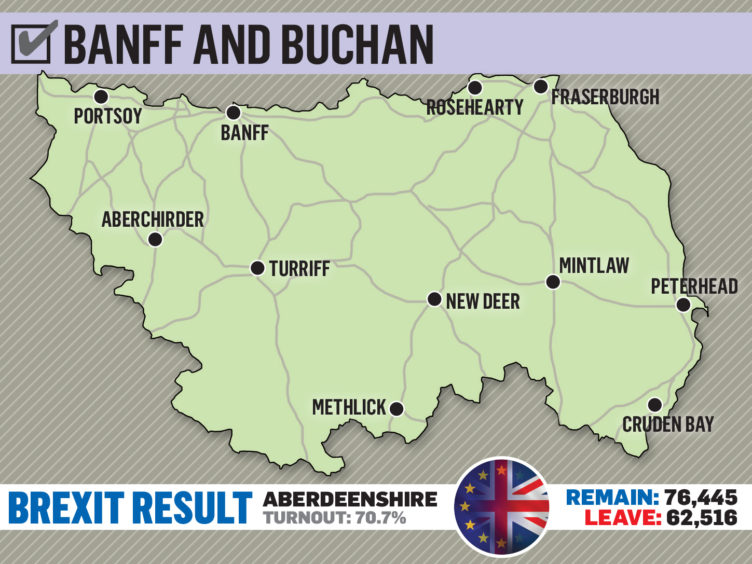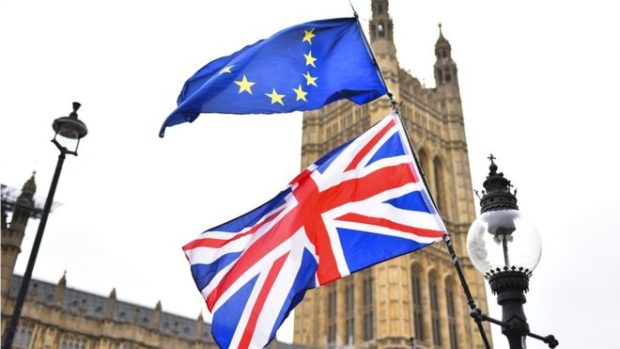The north-east was the scene for an astonishing set of election results in 2017 and none more so than perhaps the Tory victory in Banff and Buchan.
The constituency had been solidly SNP for three decades, but the constitutional questions of Brexit and independence were enough to drastically shift the balance.
Two years on and David Duguid, who overturned a 14,300 majority for the Tories, says the very same issues are at play.
Unsurprising perhaps, given the fact the constituency contains two fishing hubs, Peterhead and Fraserburgh, where anger over the common fisheries policy and support for Brexit runs higher than elsewhere in Scotland.
 The Tory success in the constituency also centred on opposition to independence, as Aberdeenshire voted strongly in favour of remaining part of the UK in 2014.
The Tory success in the constituency also centred on opposition to independence, as Aberdeenshire voted strongly in favour of remaining part of the UK in 2014.
Click a constituency to read more
“The polls and the bookies odds in Scotland really don’t reflect what I am hearing on the doorstep,” Mr Duguid said.
“I’ve spoken to hundreds of people and our message that 2020 needs to be the year to put the indyref debate on back-burner and get Brexit done and move forward is really getting through to people.”

Mr Duguid believes the Conservatives are the only party promising to deliver on the promises of Brexit at this election.
He also insists that re-entry into the EU would mean being part of the CFP, rejecting the idea it could be reformed from within as well as SNP warnings a sell-out is on the cards.
The former oil and gas management consultant said the poll on December 12 was very much a “two horse race” between himself and the SNP.
That argument would seem to be born out in the last set of national election results for the region, which saw the Tories and Brexit Party, who have stood their candidate down, come in second and third behind the SNP in Aberdeenshire at the European parliamentary elections.
Paul Robertson, 28, who is taking a run at the seat for the nationalists agreed, and said: “Labour and Lib Dem voters know the only way to kick Tories out is to go SNP.”
Mr Robertson acknowledged that the area was, relative to the rest of Scotland, more of a Brexit leaning area but hoped the “chaos” of the last two years would persuade voters to have a rethink.
“People didn’t vote for the chaos that they’re seeing at Westminster, they didn’t vote to be taken out of the single market which will cause all sorts of damage to the farming and fishing industries.”
Meanwhile, the other candidates standing in the constituency are Lib Dem Alison Smith, 44, and Labour’s Brian Balcombe, 61.
Neither is likely to challenge for the seat as their parties have never been strong in the area, but both are confident nonetheless.
Ms Smith said: “I think people are a bit fed up of the whole, vote for me because I’m not the other guy message.
“People are concerned about rising poverty and food-bank use and cutbacks at Chalmers Hospital. There’s also concern about issues like flooding that has affected this area, people are getting frustrated that a lot of this is getting ignored.”
Mr Balcombe, who contented the Banff and Buchan seat for Labour at the 1992 general election, said on the doorsteps there was fatigue with the big constitutional questions.
He said: “The Tories and SNP are trying to limit focus on indyref2 and Brexit, whereas I think people’s concerns are broader. People on the doorstep raise issues around policing, the NHS andscoial care and public transport.”
Asked whether Jeremy Corbyn’s pledge to introduce an £11billion tax on oil and gas firms had damaged his party’s standing in the north-east, Mr Balcombe said: “I think most people can understand that large oil companies, that have contributed to the climate emergency should pay something towards transitioning to a less carbon dominated economy.”
While other factors including digital connectivity, public transport and town centre regeneration will influence voters too, attitudes to Brexit and independence will be key at this election.
Prediction: Conservative hold
